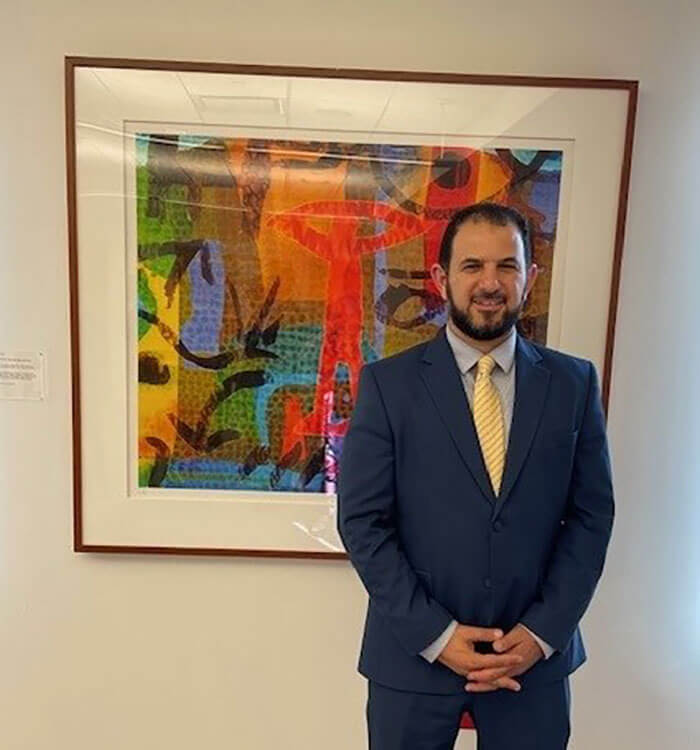World Expert in Neuroendocrine Tumors Offers UH Patients New Options
August 21, 2025
UH Clinical Update | August 2025
 Amr Mohamed, MD
Amr Mohamed, MDAmr Mohamed, MD, first knew he wanted to get advanced medical training as a high school student in Egypt – even though no one in his close family was a physician. But when his young cousin developed cancer and died while he was in high school, that cemented his plans.
“When I went to the cancer center there, I saw the people who really needed help,” he says. “It impressed on me how sad it is when there are few advances in cancer treatment. I resolved that one day, I would work in research and perhaps contribute to making it easier for these patients.”
And he’s doing just that. After earning his medical degree in Egypt, Dr. Mohamed spent some time training at national health institute hospitals and joined the military there for one year. But he then decided to pursue the rest of his medical training in the United States. He started out at Emory University School of Medicine on a volunteer research fellowship, which soon became a paid position after he succeeded in improving clinical trials accruals.
“I worked in research to get more experience, especially in how to do clinical trials,” he says.
Internal medicine residency training at Morehouse School of Medicine hospitals soon followed, with subsequent medical oncology fellowship training at Karmanos Cancer Institute and a year of advanced training in GI cancer and neuroendocrine tumor at Moffitt Cancer Center. He joined UH as Director of the Neuroendocrine Tumors Program in 2019.
What led him to pursue a specialty in this relatively rare form of cancer?
“It's not really known and doesn’t have the attention that it should have,” Dr. Mohamed says. Research, too, has been less than robust, he says – though that is changing.
Here at UH, for example, the neuroendocrine tumor program at UH Seidman Cancer Center has conducted pre-clinical research on a compound originally envisioned here called NP-101, in collaboration with Wayne State University – followed by a pilot study that showed the compound may enhance the immunotherapy efficacy in high-grade neuroendocrine cancer.
As a result, Novatek Pharmaceuticals is submitting data for the FDA to proceed with a randomized national Phase II study in patients with refractory neuroendocrine cancer, Dr. Mohamed says -- patients who currently have limited therapeutic options.
Under Dr. Mohamed’s leadership, UH was also one of the highest accrual sites in the nation for a clinical trial of an investigational drug called paltusotine – a once-daily, oral agent specifically for gastroenteropancreatic neuroendocrine tumors.
“We're able to share in a new treatment coming to the fore right now,” he says. “And now we're going to a Phase III trial. We are very proud to contribute because it improves carcinoid features for our neuroendocrine tumor patients. Diarrhea, flushing, and other problems were much improved using this medication. And it’s an oral medication, instead of having a monthly injection. It's just one tablet they take every day. It seems very promising. If this Phase III study is positive, it will offer for the first time an oral SSTR analogue instead of the monthly shot, which will definitely change the current standard of care options for neuroendocrine tumor patients.”
Dr. Mohamed is justifiably enthusiastic about this research – and the prospects for much more to come. In fact, he says he’s hoping to add a dedicated neuroendocrine tumor lab facility to the thriving program. He was also instrumental in establishing the Ohio Neuroendocrine Tumor Society to promote collaboration among several institutions.
UH CEO Cliff A. Megerian, MD, FACS, Jane and Henry Meyer Chief Executive Officer Distinguished Chair, recently recognized this extraordinary dedication to research and patient care, naming Dr. Mohamed a “Dinner with the Doc” honoree.
Jordan Winter, MD, UH Seidman's Director of Surgical Services, John and Peggy Garson Family Endowed Chair in Pancreatic Cancer Research and Jerome A. and Joy Weinberger Family Master Clinician in Surgical Oncology, endorses the choice.
“Amr is a world expert in neuroendocrine tumors,” he says. “His passion and commitment to this disease makes all his colleagues better. We rely on him for clinical expertise and guidance. Above all, he is recognized for this honor because of his devotion to his patients. Unlike any other, he never gives up hope, and for that, his patients are eternally grateful. Amr is a treasure for UH.”
For his part, Dr. Mohamed remains focused on improving outcomes for his patients.
“We have a lot of dreams for our patients to better their treatment options,” he says.
Congratulations to Dr. Mohamed on his “Dinner with the Doc” honor.


